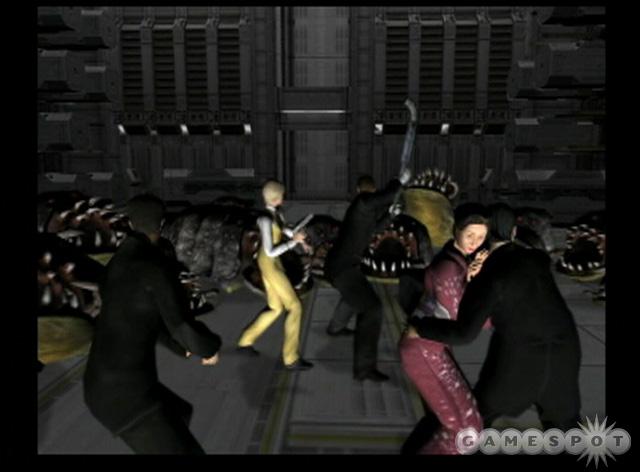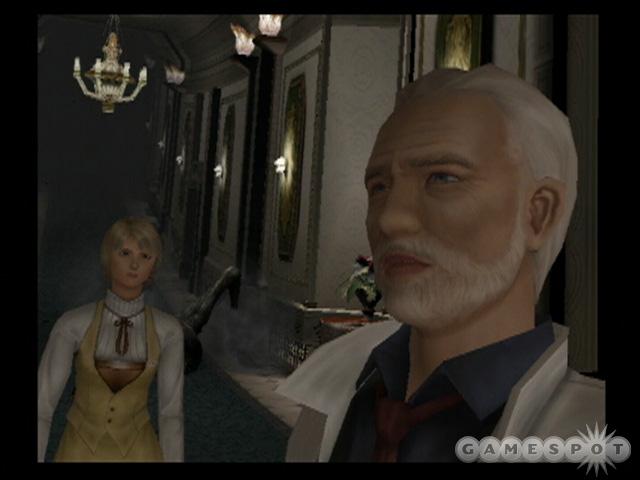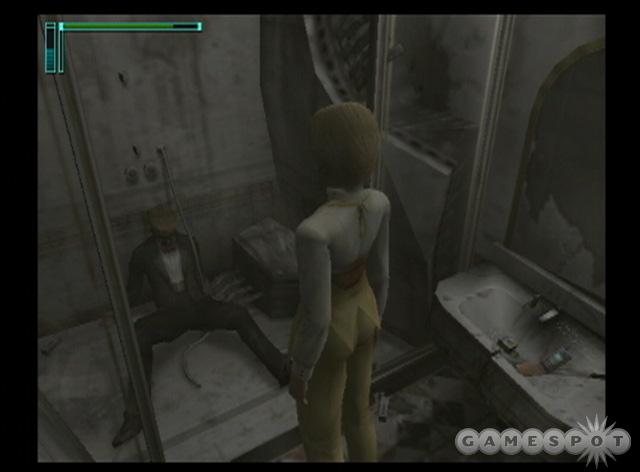If you've played video games for any length of time, you've undoubtedly had a frustrating experience that inspired you to start yelling at your television. Nine times out of 10, this rarely produces any appreciable results, but with LifeLine, Konami's new voice-activated adventure game, the primary gameplay mechanic forces you to talk to the main character by using a USB headset. LifeLine represents an ambitious undertaking, so the developer certainly deserves credit for trying something different. However, the experience is undermined by unreliable technology and some poor game design.

LifeLine begins during a Christmas party at the grand opening of a new hotel. However, this isn't just any hotel. It's a space station hotel that's suspended in Earth's orbit. As you and your girlfriend Naomi enjoy the revelry with the rest of the guests, something terrible suddenly happens. The room is flooded with terrifying creatures--who are presumably aliens--and all hell breaks loose. You get separated from your girlfriend, and the next thing you know, you find yourself sealed inside the space station's main control room. You're trapped, but you are able to see every room in the station, thanks to the hotel's myriad of security cameras. Furthermore, since you have access to the space station's central computer, you can open and close virtually any door. You eventually come across a waitress named Rio, who's locked up in the space station's barracks. She's looking for a journalist who was at the party, and you're looking for your girlfriend Naomi. As a result, the two of you team up to help each other find the people you're looking for so that you can all get off of this monster-infested space station.
So there's the setup. You're unable to directly control the game's main character, but you can open some of the doors she comes upon--and you can tell her what to do and where to go by using the USB headset. Rio responds exclusively to voice commands, so if you want her to do something, you'll have to talk her through it. Think of it like a high-tech version of the old text-parsing adventure games like King's Quest or Zork and you have a rough idea of the type of gaming-by-proxy experience you're in for.
LifeLine is by and large an adventure game. You'll explore the space station while looking for keys and other items that will help you get past locked doors and various puzzles. Movement is made fairly simple by virtue of the fact that any location you need to go to--even within a single room--is discretely labeled on the game's overlay map. Once you've reached a specific location, you'll be given a view of all the items at that location worth examining. From here, you basically have to guess what an item is before Rio can interact with it. This can be flabbergasting at times, since it's not always entirely clear what an item is. Using colors, shapes, and locations to describe an item can help sort things out more quickly, but the whole guessing game process can still prove to be quite arduous. Most of the game's puzzles are pretty obvious, but the real challenge usually involves trying to figure out the exact phrasing that the game is looking for. There are also points where the solution to a puzzle is needlessly cryptic, thus making some kind of walk-through--or an extremely patient and persistent personality--a necessity.

The game breaks up the straight adventure elements with some light combat sequences. As you wander the rooms and corridors of the space station hotel, you'll regularly run into the monsters that caused the initial havoc. The combat basically requires you to ferret out the monsters' weak points in order to dispose of them, which is done by targeting specific parts of their anatomy. The combat is pretty easy when you're facing a single enemy, but things get a lot harder when there are three or four enemies coming at you at once. The voice recognition simply doesn't react fast enough, which will likely inspire you to shout your commands quickly. This, of course, doesn't make it any easier for the game to understand what you're saying, which just exacerbates the problem. Simply put, LifeLine tries to do too much with a clunky combat system, and it will regularly leave you quite flustered.
The conceit behind LifeLine is certainly an interesting one. Forcing you to actually talk out loud to the character onscreen to get things done is a potently immersive effect, and when everything is humming, the game can feel surprisingly real. Unfortunately, the voice recognition isn't as advanced as it needs to be to effectively support the entire gameplay experience. To its credit, LifeLine is pretty good about recognizing several different descriptions for any one object. But if, when trying to identify an object, one of your guesses happens to share too many common syllables with another object in the vicinity, Rio will run off toward that object, thus forcing you to tell her to stop. Then you have to point her back toward the object you were originally trying to interact with so that you can guess again. Moreover, since the voice recognition is so touchy, you'll eventually find yourself leaving out any incidental words that you might otherwise use in an actual conversation, thus stripping all of your language down to simple verb and noun combinations. This all but ruins the illusion that you're really talking to a real person.

There are also aspects of the game's presentation that betray its concept. Specifically, this occurs through the use of the camera. The core idea behind LifeLine is that you're seeing the space station through security cameras, but you'll regularly be presented with angles that seem inappropriate for a security camera. There are also several key moments where Rio turns a corner only to see something shocking. This seems patently absurd since your character can, theoretically, access any security camera in the station. This point may seem nitpicky, but it has a pretty massive impact on how easy it is to buy the setup.
Save for issues with certain camera angles, LifeLine does an otherwise fine job of creating a believably realistic world for you to explore. You start off the game in one of the hotel's guest areas, which seems like a pretty good approximation of what a luxury hotel in space might look like. Rio, still in her cocktail waitress uniform, fits naturally into these areas. The game eventually takes you outside of the space station's civilian areas, where things are much more utilitarian and not so cozy. Rio has a costume change around the same time, which keeps her from looking out of place. Her character and the other characters you'll encounter look and move quite naturally, though some of the facial animations look a little mechanical. The game exhibits a little bit of flash and uses some nice transparency effects when monsters appear and disappear. For the most part, LifeLine's visuals do just enough to make things seem passably real.

Since the crux of the game revolves around voice communication, the game's sound design is dominated by the chatter of characters, and, of course, Rio is the dominant speaker. Rio is voiced by actress Kristen Miller, best known for her role on TV's She Spies, whose sound represents a solid fit for the young, blond Rio. Her delivery, while not out-and-out terrible, seems a little leaden. It's as if Ms. Miller didn't have a lot of passion for the role. The voice acting for the other characters isn't much better and oscillates between stilted and overly dramatic. The other sound effects, which include various explosions, some gunfire, and the creepy hissings of the monsters you encounter, seem acceptable.
There's a lot of potential in the premise behind LifeLine, and despite the game's many imperfections, there are moments when everything clicks. In these instances you're given experiences that are truly unique. However, there are other moments, like when Rio is unable to understand your commands, that will leave you feeling like you're playing a run-of-the-mill adventure game--but with broken controls. If the ratio of these moments had been more in favor of the unique, memorable ones, LifeLine would be a much easier game to recommend. As it stands, though, LifeLine is a game with ambitions that outstrip its technology and design.